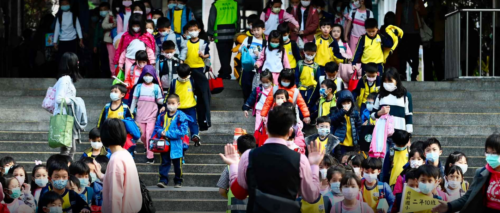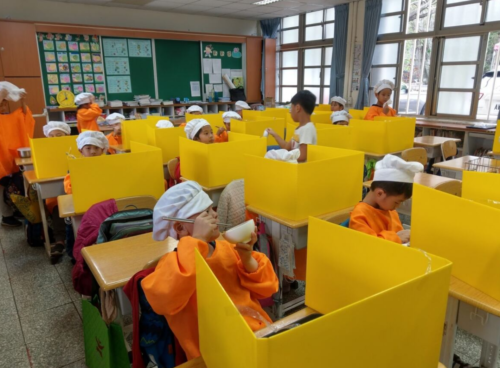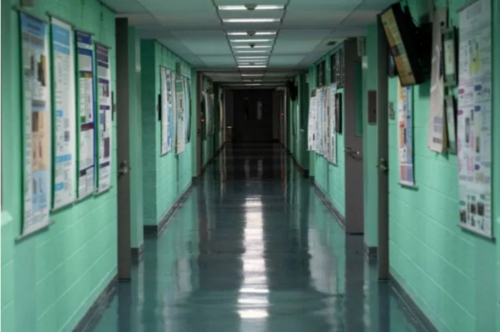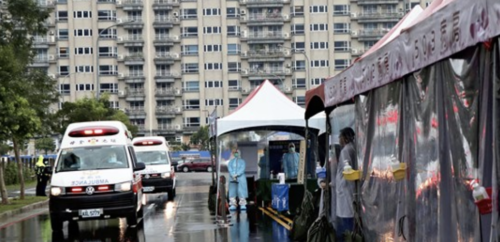 Inside Taiwan during COVID-19: How the country kept schools and businesses open throughout pandemic
Inside Taiwan during COVID-19: How the country kept schools and businesses open throughout pandemic
By Caitlin Taylor, Stephanie Kampf, Tyana Grundig and David Common, CBC, Marcy 21, 2020
See video here:
https://www.cbc.ca/news/business/taiwan-covid-19-lessons-1.5505031
Taiwan acted early to make sure there were supplies of masks, sanitizer
It’s almost life as usual for the Lin family of Taiwan during the coronavirus pandemic — with a few noticeable exceptions.
“We didn’t worry too much,” said Leeli Chang, who lives with her husband, Terry Lin, and her daughter, Peggy, 8, in a suburb of Taipei.
The family, like many in Taiwan, has continued to go to work, to school and out shopping as normal since the COVID-19 pandemic began, but now with some precautions in place — such as regular temperature checks and hand sanitizer dispensers outside most public buildings and protective masks.
Taiwan was hit hard by the SARS pandemic in 2003, but this time, the government took swift and early actions when it first became aware of an unknown pneumonia in Wuhan, China.
By mid-February, the territory had increased its mask and alcoholic sanitizer production, introduced fines for raising the price of medical supplies and set cleaning standards for public transportation and other areas, such as trains and schools.

Taiwanese children eat their lunch at school. They only take their masks off when the dividers are up to prevent infection. (Joyce Huang)
Taiwan Has Been Shut Out
of Global Health Discussions.
Its Participation
Could Have Saved Lives

A view of an empty hallway at the Taipei American School in Taipei on Feb. 24, 2020. Walid Berrazeg—SOPA Images/LightRocket/Getty Images
By Anders Fogh Rasmussen, TIME, March 18, 2020
Anders Fogh Rasmussen was the Prime Minister of Denmark from 2001 to 2009.
https://time.com/5805629/coronavirus-taiwan/
Eight hundred and fifty thousand of Taiwan’s 23 million citizens reside in mainland China. Four hundred thousand work there. At its narrowest point, the Taiwan Strait between the island and the mainland is just 130 km.
So, by all accounts, Taiwan should be in the midst a major coronavirus outbreak. Instead, as of March 18, it had seen just 100 cases compared to the more than 80,000 in China and the tens of thousands in several countries in Europe.
This has not happened by chance.
Learning from the experiences of SARS in 2003, Taiwan was ready when the outbreak in Wuhan occurred. After the first notifications at the end of 2019, Taipei swiftly deployed a combination of measures to identify and contain the virus, including the use of big data to help contain potential cases.
The global health community could have learned from Taiwan’s experience.
But in recent years its world-class health specialists have been shut out in the cold by Beijing’s geopolitical obsessions. In 2016, Taiwan’s President Tsai Ing-Wen came to power with a mandate to assert her people’s autonomy.
China did not take kindly to this democratic challenge to its “One China” policy and bullied the world’s multilateral institutions into dealing only with Beijing. As a result, Taipei was denied access to a number of international fora which it was previously able to attend as an observer.
Taiwan Shows Its Mettle
in Coronavirus Crisis,
While the WHO is MIA

By Don Shapiro, Brookings, March 19, 2020
As the coronavirus pandemic takes a rapidly increasing toll on the health and well-being of people around the world — as well as the global economy and social fabric more broadly — Taiwan has won widespread recognition for its impressive performance in dealing with the crisis. Relying on a combination of preparedness, technology, and transparency, Taiwan has managed to limit the number of reported cases in Taiwan so far to 108 (with just a single coronavirus-related death) — far fewer than in neighboring countries.
The public health professionalism and sense of global responsibility Taiwan has displayed underscore the irrationality of Taiwan’s exclusion from the World Health Organization and its information channels due to political objections from China.
A key element in Taiwan’s preparedness was the lessons learned from its devastating experience with the SARS epidemic in 2003, which caused 71 deaths on the island of 23 million people. Seeing that the initial response to SARS was hampered by the lack of a centralized decisionmaking body to take charge during a health crisis, Taiwan later that year authorized the creation of a Central Epidemic Command Center (CECC) to coordinate across government departments and mobilize the necessary resources during future crises.
To fight the current coronavirus, the administration of President Tsai Ing-wen activated the CECC as early as January 20, with the minister of health and welfare designated as the commander. Over the following weeks, the CECC put scores of measures into effect to aid in containing the disease and preventing its spread into the general community. This included screening incoming travelers for fever and implementing a system of rationing face masks to prevent hoarding.
The steps also included mandatory self-quarantine for people who had recently traveled to affected parts of the world, while self-isolation was recommended for those who had come in contact with potentially exposed individuals. The existing neighborhood warden system facilitated enforcement of the quarantines and helped deliver meals and other assistance to those who needed it.
Border controls were also implemented. Beginning February 6, Taiwan started prohibiting entry by anyone who had been in China or Hong Kong during the previous 14 days. The restrictions were imposed on more countries and areas as the coronavirus spread, and by March 19 the travel ban had been extended to nearly all foreigners without Taiwanese residence certification. All travelers returning from abroad are now required to undergo two weeks of self-quarantine.

